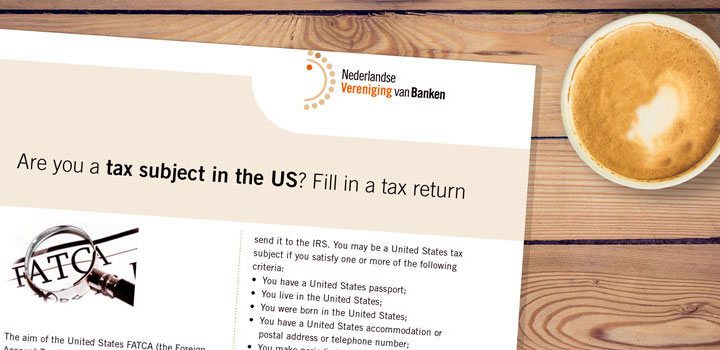
NVB: FATCA US-TIN not required for balances under $50,000

The Netherlands Bankers’ Association (NVB) announces that after September 1, Dutch banks will not close accounts of so-called coincidental Americans if the balances in the checking or savings account do not exceed $50,000.
Coincidental Americans, FATCA, and US-TIN/SSN
Dutch coincidental Americans are Dutch citizens who the US sees as American: Dutch citizens who automatically have US citizenship by birth, parents, or Green Card. These citizens get into trouble because the US has an extraterritorial tax obligation. Everyone with American nationality must file a tax return in America, even if they have only lived there for a short time or not at all. This can lead to double taxation.
The American Tax Act (FATCA) requires banks to pass on the name, address, and balances of such an account holder, stating his/her tax number, and a TIN/SSN of all US persons in their client files to the Dutch Tax Administration. The latter then passes on the data to the IRS.
US-TIN not required for balance below $50,000
Last year, Dutch banks decided to refrain from closing accounts of U.S. Dutch citizens without a TIN until September 1, 2022, to give room to find a long-term solution with U.S. authorities.
Now the NVB is letting it be known that even after September 1, no accounts will be closed for so-called coincidence Americans if the balances in the checking or savings account do not exceed $50,000.
Coincidental Americans with balances above $50,000
For the group with a balance above $50,000, the account will not be closed if they can be shown to be in the process of applying for a U.S. Social Security Number (US TIN/SSN) or have begun the process of renouncing their U.S. citizenship.
In any case, to avoid problems when the balance rises above $50,000 during the year, it is wise for US citizens to start the application process for a US TIN.
A balance of more than $50,000 may seem like a lot to many casual Americans, but it can suddenly be achieved through, for example, the sale of a car, the receipt of vacation pay, the sale of a house, and the receipt of an inheritance. Sometimes even unplanned. The bank should, if the balance was above 50,000 at any time during the year, pass on the account details with US-TIN/SSN.
US-TIN/SSN applications and US tax returns
Coincidental Americans usually do not have such a number, and applying for one takes a lot of time and effort. Renouncing American citizenship is a possibility, but obtaining the required Certificate of Loss of Nationality (CLN) takes a long time and is very expensive. Moreover, a tax return must still be filed for the past five years, the so-called exit tax.
Need more information about Dutch banks and US-TIN/SSN?
We, the founders of Americans Overseas, were born in the Netherlands and obtained our American nationality through our (American) mother. When we heard about this for the first time around 2013, we were in total disbelief (it can’t be true!), anger (how can they do this?), fear (am I going to get fined or pick up other problems?), and panic (what should I do?).
It is (unfortunately) true that there is an additional American tax levy. But there’s no information from the local government, and when approached, the consulate referred us to the IRS, and the IRS was impenetrable.
That’s why we started this initiative to help people from all over the world by providing proper information to avoid unnecessary panic and offering help free of obligation and free of charge. If needed, we have a network of affordable professionals (accountants) who can help you with your tax obligations.
If you have more questions about how to renounce US-TIN/SSN applications and US tax returns you can contact us at Americans Overseas.
Contact us for more information
Source: NVB
Frequently asked questions
Understanding the US tax system, the obligations, and all the additional terms can be difficult. Especially if one lives outside of America. Is your question not answered? Contact us.
-
Who is required to file taxes in the US?
U.S. citizens and resident aliens who live abroad are generally required to file a federal income tax return and pay taxes on their worldwide income.
Read more... about Who is required to file taxes in the US? -
Do US citizens living abroad still have to file taxes in the US?
Yes, US citizens are required to file taxes on their worldwide income, regardless of where they are living.
Read more... about Do US citizens living abroad still have to file taxes in the US? -
How can I cash my US check?
Received an American check? You can cash your check in the following ways: cash the check at your own bank, transfer to another person (endorsement), cash checks using an online service or cash the check by another bank.
Read more... about How can I cash my US check? -
Are there any special tax forms required for US citizens living abroad?
US citizens living abroad may be required to file Form 2555 and/or Form 1116 to claim the foreign-earned income exclusion.
Read more... about Are there any special tax forms required for US citizens living abroad? -
What is FBAR filing?
FBAR (Foreign Bank Account Report) filing is the requirement for certain U.S. individuals and entities to report their foreign financial accounts to the Financial Crimes Enforcement Network (FinCEN) of the U.S. Department of Treasury. The FBAR filing requirement applies to U.S. persons who have a financial interest in, or signature authority over, one or more foreign financial accounts if the aggregate value of those accounts exceeds $10,000 at any time during the calendar year.
Read more... about What is FBAR filing?





